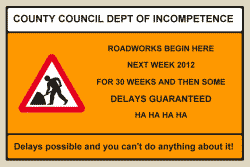This email alert came in via the DSA. The entire situation is down to a bunch of arseholes and a union. So just a big bunch of arseholes really. This simple fact doesn’t stop the lower primates trying to blame the DSA somehow.
I can’t really think of any publication out there (other than the Arseholes’ Union Newsletter) which would advise the public to go out and panic buy, break speed limits, queue at forecourts on purpose to cause disruption, and so on. So the DSA’s advice is:
Motorists can also help by following the following sensible advice:
- don’t change your purchasing behaviour, refuel as you normally would, planning ahead if you have a long journey to go on
- stick to speed limits as this helps conserve fuel
- don’t queue at petrol forecourts, this causes congestion and increases disruption
- check travel sites and latest news before travelling
In actual fact, this is what all the newspapers are saying, and the AA, and other motoring groups. It is the standard advice at times like these.
The only problem is that people who aren’t tanker drivers and who aren’t fully paid up members of the Arseholes’ Union are not automatically any further up the evolutionary ladder. And they WILL go out and panic buy.
My opinion is that the media should simply not publicise the Arseholes’ Union’s intentions. But since that is never going to happen, sensible advice has to be given – even if people aren’t going to follow it.
Addendum: And it transpires that the Mickey Mouse coalition – much beloved by many of the lower primates out there – actually HAS advised people to panic buy.
The Fire Service is furious, because apart from the danger to the pond life which will be storing it in plastic buckets in its kitchens and bedrooms, there is also the danger to firemen who enter burning buildings not expecting to find gallons of fuel sitting around.
There was a queue outside Morrisons in Netherfield this afternoon. All the mummies in their 4x4s taking “sensible precautions” as advised by Cameron and his gang.
 I just noticed a Google ad which said “don’t become a driving instructor – cleaners earn more”.
I just noticed a Google ad which said “don’t become a driving instructor – cleaners earn more”. I’ve written about this before, but the Kirk Lane/Flawforth Lane junction with the A60 seems to have some sort of cosmic significance as far as major roadworks go.
I’ve written about this before, but the Kirk Lane/Flawforth Lane junction with the A60 seems to have some sort of cosmic significance as far as major roadworks go. Top Gear – the BBC programme about cars, hosted by chimpanzees, and avidly watched by pond life (my opinion, of course) – has had its fair share of rows about whether some of its stunts are real or not.
Top Gear – the BBC programme about cars, hosted by chimpanzees, and avidly watched by pond life (my opinion, of course) – has had its fair share of rows about whether some of its stunts are real or not.